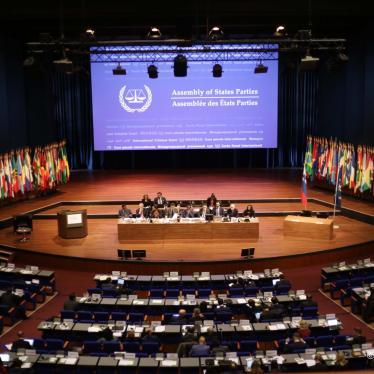
In advance of the session, Human Rights Watch issued an 18-page report making recommendations to ICC member countries attending the Assembly of States Parties meeting in The Hague from December 6-11, 2021. At this year’s meeting, the Assembly’s 20th, member countries will further address the extensive review by independent experts of the court’s performance. They will also hold elections for deputy prosecutor, following the election earlier this year of a new prosecutor, Karim Khan.
“In a highly conflicted global terrain, the ICC is needed even more than imagined two decades ago,” said Richard Dicker, international justice director at Human Rights Watch. “ICC member countries should refocus their efforts on ensuring that the court gets the political and practical support it needs to deliver justice.”
In September 2020, a group of independent experts commissioned by the Assembly issued its final report on improving the court’s performance, following setbacks in key areas of the ICC’s work. Over the past year, member countries and the court, together with civil society groups, have begun to assess the nearly 400 recommendations contained in the report. At this Assembly session, governments are expected to assess the progress and to adopt a resolution renewing their work on the review for another year.
Many member countries have insisted in the review process on respect for the court’s independence and transparency, Human Rights Watch said. To expedite progress over the next year, member countries should focus their discussions on the expert review’s recommendations on their own government responsibilities for the ICC, including those related to cooperation, improving election procedures, and ensuring that the court has the funding it needs to deliver on its mandate.
Member state cooperation with the court should be bolstered, Human Rights Watch said. The removal earlier this year of punitive US sanctions on court officials provides the most recent example of member countries, the court, and civil society groups working together to defend the court’s mission. Member countries should prioritize implementing the expert review’s recommendation to develop a strategy to counter politicized opposition to the ICC’s investigations.
Member countries at the Assembly will adopt the court’s annual budget. There is a widening gap between the court’s workload and available resources. The budget, funded by member countries, has been held to near-zero growth since 2017. With the opening of three new investigations this year, in Palestine, the Philippines, and Venezuela, the court now has 16 situations under investigation. The prosecutor is also seeking to resume a limited investigation in Afghanistan.
For the court to be impartial, it is important that its delivery of justice is not perceived as overly selective or one-sided due to resource constraints. In this vein, member countries should follow through during this session on setting into motion plans for a stakeholder conference recommended in the expert review to discuss the court’s optimal activity level and the resources necessary to properly invest in international justice, Human Rights Watch said.
Given the important role of deputy prosecutor in shaping the Office of the Prosecutor, this session’s election is crucial, and member countries should approach their decisions with strict attention to merit. While a much-needed due diligence process aimed at ensuring candidates are of “high moral character” was put in place for this election, it was done hastily and without civil society consultation. Member countries should adopt text in a resolution this session that will pave the way for developing a permanent vetting mechanism next year for all future ICC elections.
“The Assembly of States Parties’ 20th session marks an important juncture for the ICC and the expert review process,” Dicker said. “Governments need to take the actions necessary for the court to realize its crucial mandate.”










Add new comment